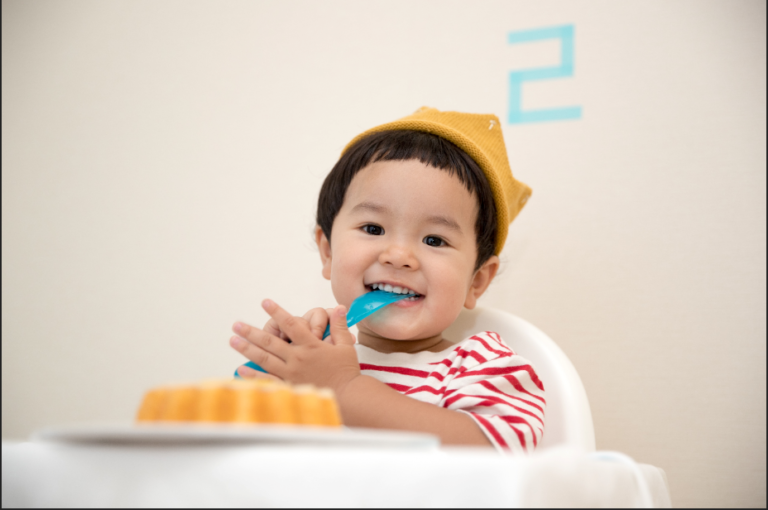Founded in 2002, Balabala (巴拉巴拉) is a Chinese brand producing clothes and accessories for children from 0 to 14 years old. It is part of the Semir Group, one of the top 5 apparel groups in China by market share. The brand has gained increasing popularity recently and is now the number-one brand in the children’s wear market.
After a year of loss, the children’s wear market is back on the rise
According to Statista, as of 2021, the children’s wear market in China represents 12% of the total apparel sales. Due to the COVID pandemic, in 2020 the market registered a setback of -9%, but it recovered quickly within a year. Despite the current crisis of newborns, the children’s wear market is one of the fastest growing sectors, together with the sportswear market.
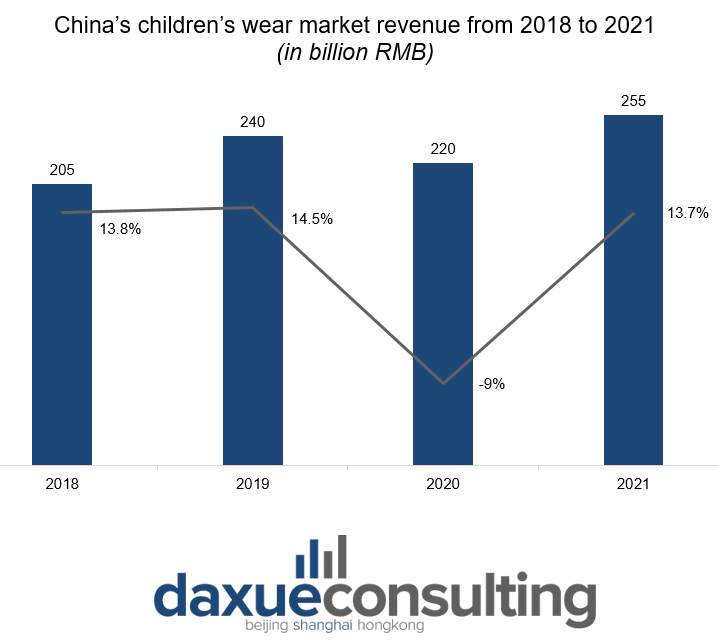
Balabala’s stand in the Chinese children’s wear market
Balabala is the leading brand not only in China but also in Asia. It counts more than 4,700 stores, around 60 of which are located outside mainland China, and it operates in 11 countries. Although it is the best-selling brand in China’s children’s wear market, it still needs to beware its many competitors. According to Statista, as of 2022, Balabala owns 6.8% of the market, followed by Anta Kids with 3.7% and Adidas with 1.3%. However, due to the sudden rise of Douyin’s influence on China’s children’s wear market, other e-commerce brands have had the chance to quickly improve their performance.
According to the social media data provider Guoji (果集), the top 3 kidswear brands in China in 2021-22 were Balabala, Disney and Chenchen Ma (晨晨妈).
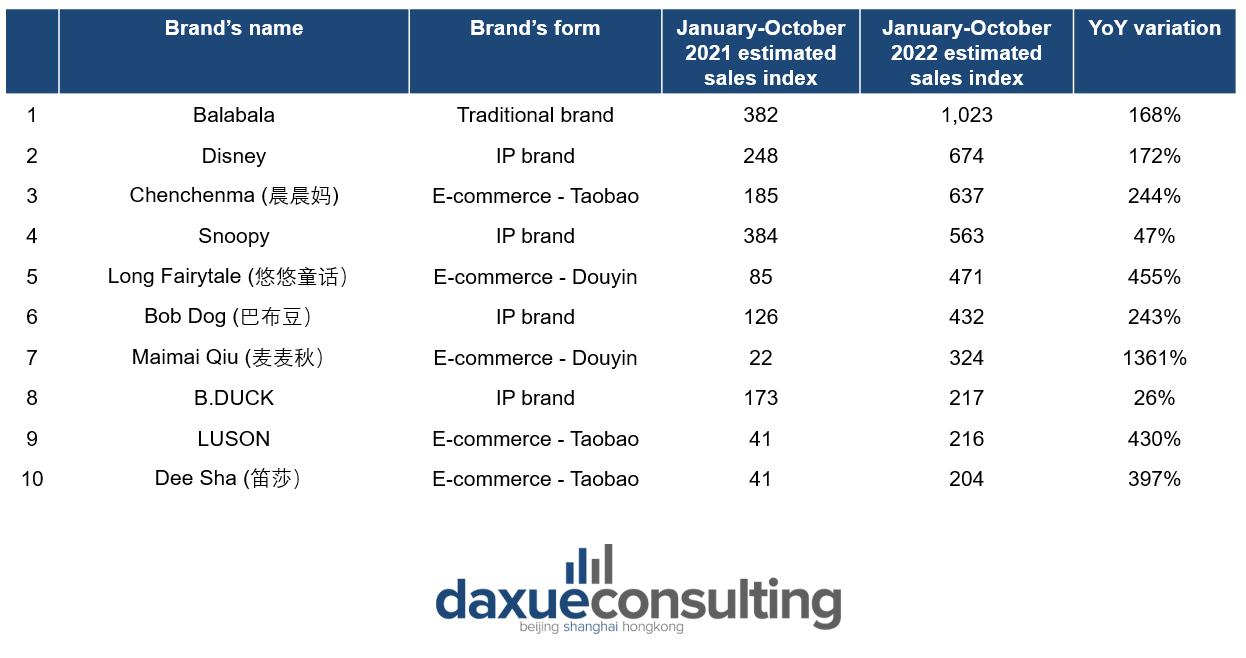
Balabala’s branding strategy displays its simple yet fashionable style
Since its foundation, Balabala’s mission has been to give children the chance to express themselves freely through clothes. For this purpose, it offers a wide range of fashion designs in line with its motto ‘Same Childhood Different Lifestyle’, which fosters common values like love, dreams, and happiness to live childhood in a personal way. To convey these feelings, the brand has adopted a joyful and colorful personality, that is perfectly portrayed in the choice of the brand’s logo and offline store design.
Balabala produces clothes that are fashionable yet comfortable, simple yet original. This dualistic vision is also prompted by the use of simple geometric shapes, the circle and the rectangle, which are adopted in both the brand logo and the offline stores’ interior designs.
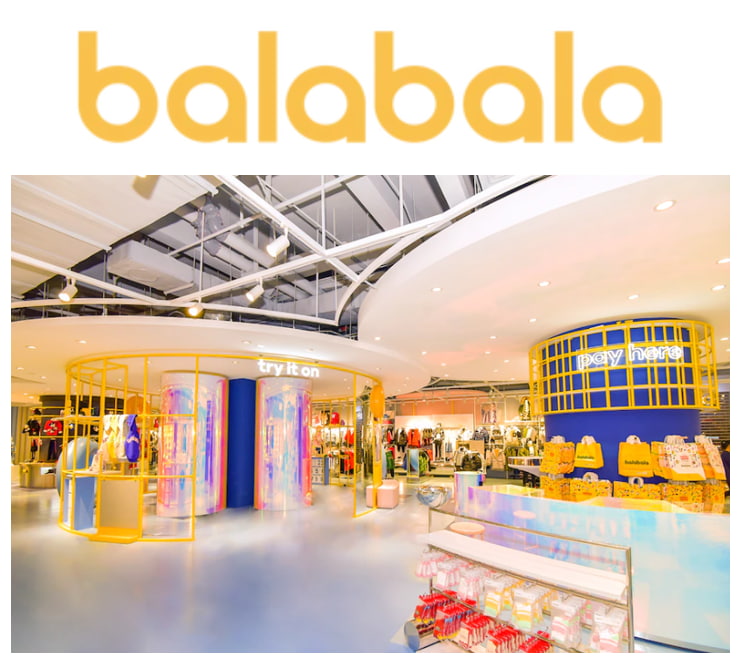
Balabala values R&D
As a children’s garment brand in China, Balabala needs to prove it is advanced and innovative to attract the attention of new millennial parents. Because of this reason, the brand highly values R&D and uses advanced information technology to promote new products.
The WeChat membership system
In 2019, Balabala started building up a WeChat mini program, which in 2020 was already connected to 3,000 offline stores in China and generated more than RMB 30 million in sales.
Such a success can be attributed to its effective membership system on WeChat. Balabala VIP new members can claim RMB 8 discount on their first purchase, get 30% off on the date of their child’s birthday, and receive gifts by exchanging points. Points are earned via a daily check-in system, through purchases, and by completing information and member tasks. Furthermore, by checking in the app regularly it is possible to receive free gifts. Through the VIP program, members can participate in interactive activities, collect coupons and talk to an exclusive shopping assistant.
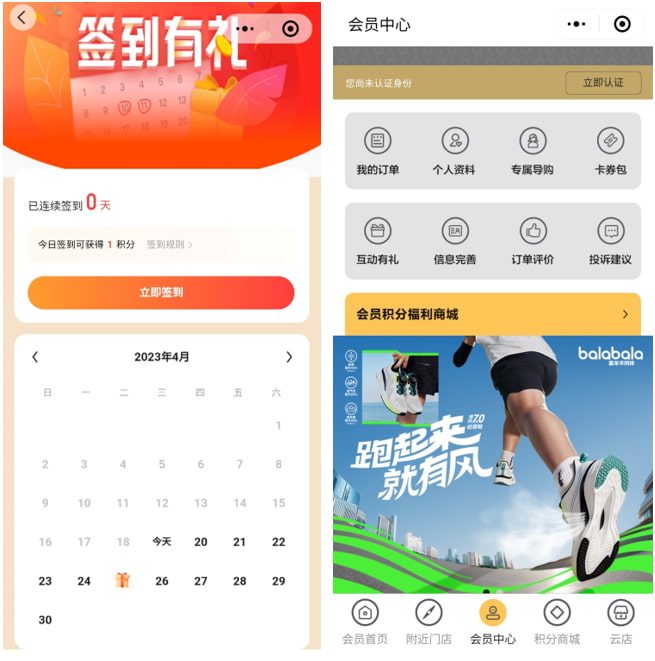
Independent live-streaming on Douyin
According to Guoji’s research, from January to October 2022, the children’s wear market recorded an 83% increase in visibility on Douyin compared to the same period the previous year. As of now, Douyin is the best platform where to promote products for children and Balabala has been taking advantage of this. It broadcasts around 17.6 times a week, each broadcast being around 6 hours long. 78% of its Gross Merchandise Value (GMV) is earned via independent broadcasting. The following graph breaks down the main social media platforms providing visibility to Balabala.
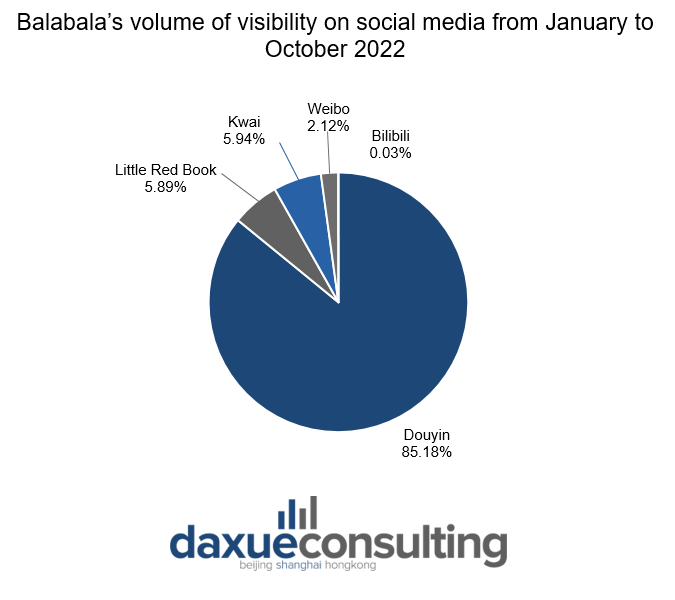
Balabala attempts to target the younger generation of parents
Around 55% of Balabala’s products are situated in the price range of RMB 0-100, while 43% are about RMB 100-300. Hence, its target consumers are middle-income families. Furthermore, the brand’s growing presence on social media like Douyin suggests that it wants to move on to targeting a younger audience, such as Millennials and Gen-Z parents.
To get closer to the new generation of parents, in 2022 the virtual influencer Gu Yu (谷雨) was chosen as the new global brand ambassador. In the Chinese tradition, the term gu yu refers to the rainfall season starting in April, which is the right time to sow crops. The brand chose this name as a metaphor for promoting their brand vision. Just like the rainfall aids crops to grow naturally, Balabala wants to provide children a way to grow freely, with no restriction to their personalities.

Leveraging on franchising to spread worldwide
Balabala’s vision is to become an international brand, that can be appreciated by kids from all over the world. As of 2023, it successfully entered the markets of other 11 countries besides China, some of which being in the Middle East and South-East Asia. Between 2022 and 2023, it opened two stores in the United Arab Emirates and this year it opened a second store in Cambodia.
Encouraging cooperation with local entrepreneurs
90% of Balabala’s offline stores are operated through franchising. Although the brand keeps the right to decide on certain matters, like the interior design of the store and the products’ supply, it is up to the franchisee to decide on the store location, the channel developments, and the retail management, while most of other business decisions are taken jointly.
Balabala is constantly in search of new partners from any market and encourages partnerships with other brands and artists. For instance, in November 2022 it launched a partnership with Kris Van Assche to celebrate its 20th Anniversary. The Belgian fashion designer, also known as the former Creative Director of Berluti and Dior Homme, designed an exclusive collection, which was available for sale only on Tmall, in 20 premium shops, and in 2 flagship stores in mainland China.
Same childhood, different lifestyles: the colorful world of Balabala
- Balabala is a childrenwear brand founded in 2002 targeting children from 0 to 14 years old.
- After a temporary setback due to the COVID pandemic, China’s children’s apparel market is back on the rise and it represents 12% of the whole garment market share.
- Balabala is the top-ranking children’s wear brand in China and in Asia. Among its main competitors are Anta Kids, Adidas and Disney. However, the market has proven to be unstable and constantly evolving. Thus, it is important to beware of the many competitors and keep up with the market changes.
- The brand highly values R&D and technology development. In 2019, it launched a successful membership program on WeChat, endowed with a point-collecting system. It has a strong presence on Douyin, where it makes live broadcasts around 17 times a week.
- The brand wants to target the new generations’ parents. In 2022, it chose the virtual influencer Gu Yu as its global brand ambassador.
- Through franchising, Balabala intends to become an international brand. It already operates in 11 countries besides China. It also encourages cooperation with other brands and artists.
Author: Chiara M. Barbera
Download the ASEAN x China business relations report




